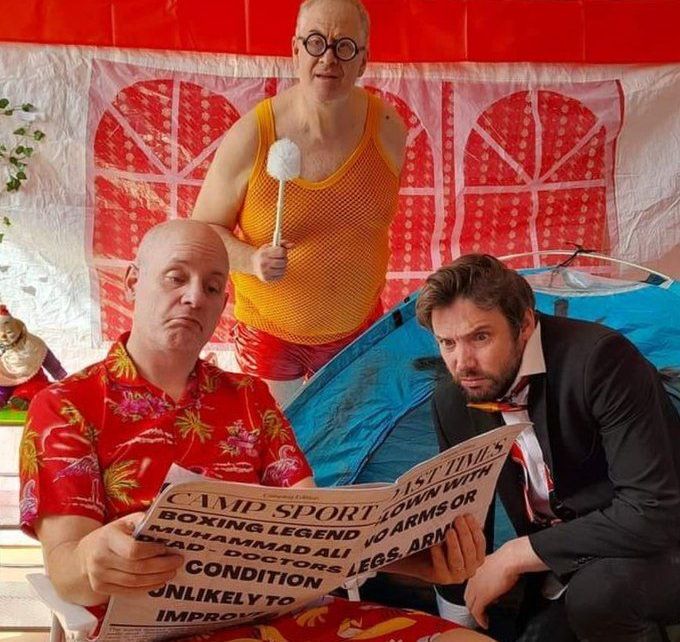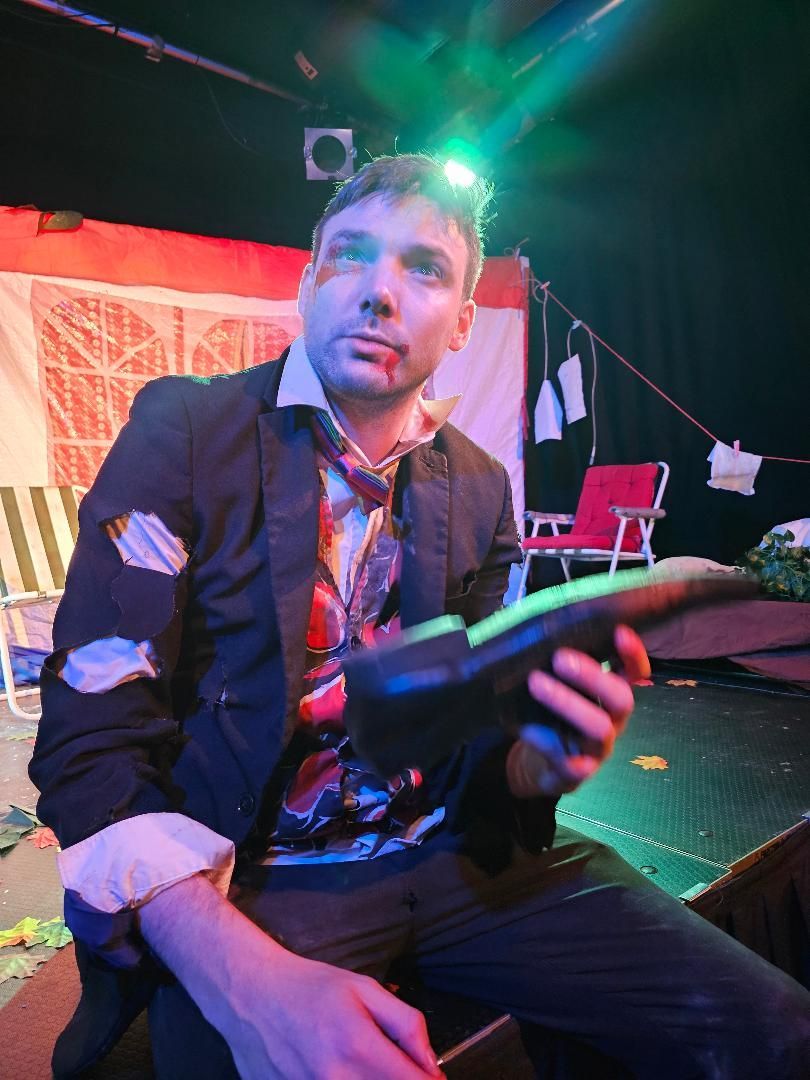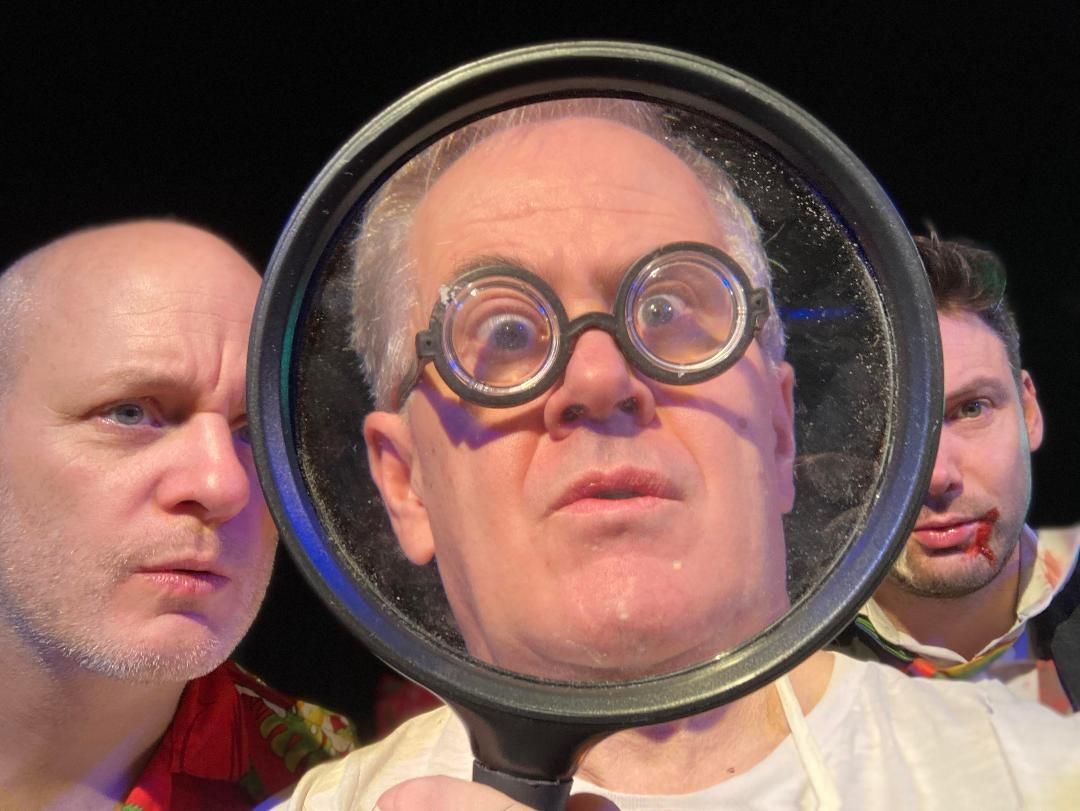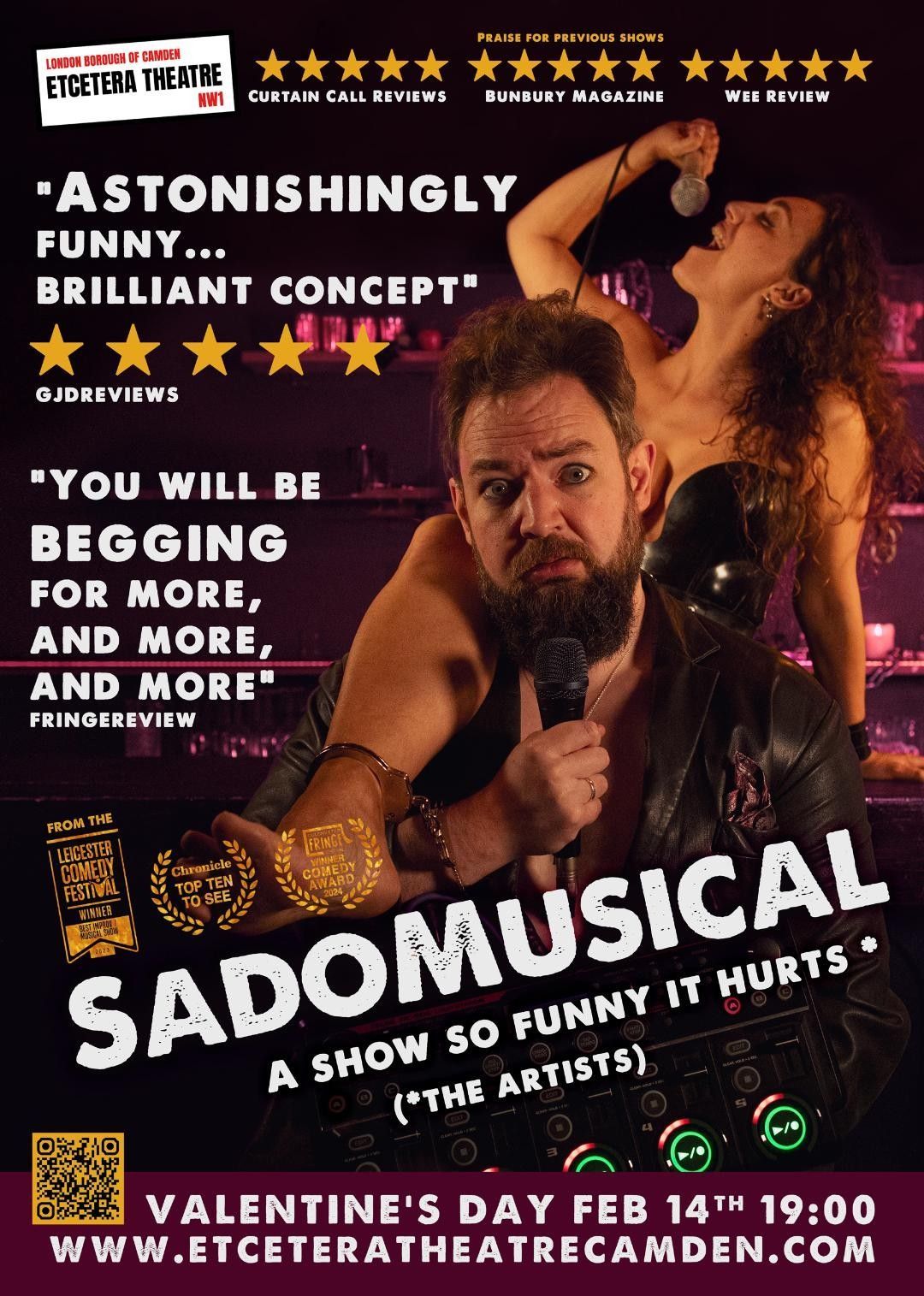I produced a theatre show this year and wanted to share some things I learned from dealing with numerous theatres across the UK. Some of my experiences are poor, some great – but overall, it has been a real lesson. I’m a first time producer – I got some things wrong, some right and had successes and disasters along the way.
I have just finished touring Past Tents around the UK – a comedy drama that my production company, Two Teeth Tom & Prison Phil Productions (co-owned with Seth Jones), first performed 5 years ago, before Covid wiped out the production.

Image: Seth Jones (on right) David J Keogh (on left) and Mark Keegan (standing) in multiple 5 star show Past Tents
On 5th January this year, I got a call from Seth to get the show back on the road – we were at a creative loose end and as we were well received last time out, with numerous 5 star reviews and fantastic audience feedback, I thought… why not? And rather than just do one show in one venue, I thought … why not do a tour? What could I have to lose?
The previous year, Seth’s close actor/writer friend, Sean Smith, had tragically taken his own life – Seth himself had gone through a terrible time dealing with this and his own relationship breakup in the aftermath. So, we both decided (as creatives often do), to harness all this pain and do something positive with it – in memory of Sean and the impact of his loss – but wider than that – on the issue of how men deal with (or often don’t) their mental health.
We re-wrote the play – after feedback, a lot of reflection and recent events, we wanted to make Seth’s character Alan, more sympathetic and relatable – and factor in the darker side of mental health. I ran it past the men’s mental health charity ‘Manup?’ to ensure we’d dealt with the subject properly and safely. They loved it and signed up as moral sponsors of the play.
Seth and I inspected every line and action in the play (something we are doing again now that the tour is over) and made sure it was the highest quality we could make it. I also invested in and updated/improved a number of props to scale the play up. Seth and I also convinced the amazingly funny and very talented Mark Keegan to come back and rejoin the three man cast. But, I wanted to do things differently; better. Previously the play was a profit-share fringe show and I wanted this done more professionally – I applied for funding, spent weeks on the maths and ensured I had a solid plan for touring where everyone gets paid.
LESSON 1: PLAN YOUR TOUR ON THE ASSUMPTION YOU WON’T GET FUNDING
I was declined Lottery funding – no real reason given. I’d spent weeks on the application, covered every angle, but it was clear they hadn’t read it properly from the generic response we got – one point of feedback was ‘How are you reaching out to youth’ which is ridiculous for a play about men’s mental heath that was only appropriate for adults. But I wouldn’t let that defeat us. If we had have got funding, that would have made things easier, but I would still have treated that money as my own to ensure it was spent well.
I moved on regardless, scaled back my ambitions a little and settled on something a small to medium theatre would love to have. I got a PRS licence for the music (easier than I thought it would be) and took out the required insurance etc. I arranged proper contracts and pay for those involved. I decided I couldn’t afford a Stage Manager/ASM/Tech to tour with us, so would use local techs. I’d ASM myself to save costs.
I looked at every appropriate theatre in the UK I could find. I knew, because of investment in props etc, I’d probably make a loss overall but decided it was worth it for the opportunities the tour might create for the future. I was at peace with that – the savings account and credit card would have to suffer and I felt I could suffer the worst case scenario without too many tears (there were still a few).
I produced a great-looking pitch deck, emailed over 75 theatres, sat back and waited for the shed-load of responses offering us space and time. A stroke of good fortune and kindness meant I managed to get my local council-run theatre in Chesham, The Elgiva, to let me have a Friday night at minimal cost to try and bring drama theatre to the town (like a lot of council run theatres, their usual fayre is mainly made up of tribute bands and musical stuff so this was quite a departure).
The Elgiva was fabulous – I used this as the first night to test the new writing and make any improvements needed prior to the tour. I had our first date booked – 5 months away.
LESSON 2: MOST THEATRES DON’T RESPOND
I waited… and waited… and finally got some responses after numerous chases: six in fact. Yep, six out of 75 theatres bothered to respond. With so many theatres shutting down or struggling, it’s hard to fathom why. Apathy? Defeatism? Poor administration? Maybe they didn’t like our offering, but few bothered to tell us. The number of theatres that no longer existed after the pandemic was a shock too.
One Leicester theatre eventually responded after a third request, only to give me a list of reasons why they were struggling to get audiences into their space – an email so depressing I decided to look at their website – it was awful – uncared for, lazily managed, unappealing. They had very little social media and came across as a theatre that had given up.
Another in Liverpool responded six months later, saying they’d only just got around to checking their email. I was astounded at the apathy. Maybe it’s because these spaces are often run by creatives who don’t have a lot of business experience – the old adage ‘make it and they will come’ doesn’t apply to small theatres – you have to advertise and do publicity as a bare minimum and so many don’t. Simply whacking out a Facebook post a week before and hoping people will come is not a great plan for success. As producer – I now always check this first.
LESSON 3: SOME THEATRES OVERCHARGE HORRIBLY
I had responses from 2 theatres – both 50-80 seaters (no names but London based), asking for between £5k and £6k for a week’s hire -tech support and ushers/box office staff cost extra – they both also charged for the get-in. Frankly, for a small space, this is a huge rip-off. I cannot possibly sell enough tickets over 5 days to make any profit or pay wages. For a touring show, unless you know tickets will sell, this could be catastrophic and a bad waste of lottery money if you had managed to secure funding. I’m frankly disgusted by some of the quotes I got.
There’s nothing wrong with paying a hire fee or going for a profit share (70/30, 60/40 or 50/50 depending on how much promotion/PR work they do) but staff should not cost extra – I was happy for one of us to support the box office and always happy to pay for a local tech, but that was my limit. I don’t know how these theatres get away with it or how small theatre companies can afford it. Genuinely shocking.
LESSON 4: IF A THEATRE IS BAD AT COMMUNICATING, IT’S A BAD SIGN
If a theatre doesn’t respond quickly or ignores email requests, it’s a sign they’ll be bad at organising in general. I avoid these like the plague and declined to work with a few as they were so poor at communicating – imagine how bad they might be at the things that matter? It isn’t worth the risk.
LESSON 5: ALWAYS ASK WHAT THEY DO TO PUBLICISE YOUR SHOW
My favourite theatre, the Jack Studio Theatre (Brockley Jack) https://brockleyjack.co.uk/ in London, had a real plan for getting bums on seats. They contacted local media, did leaflet drops, advertised all over social media, contacted reviewers, encouraged me to give them pictures/videos and used our reviews to publicise the play.
They re-designed my leaflets to suit their venue and worked hard to ensure we succeeded. Despite being up against the Rugby World Cup, we had comparatively good audiences most nights. We had a similar experience with the excellent Alma Tavern Theatre in Bristol https://www.almatavernandtheatre.co.uk/
Some theatres do nothing (if you use a college theatre for example) and that’s okay if you’re able to do a lot of the ticket booking yourself (for example if the theatre’s local and you’re willing to do a leaflet drop yourself or know people locally). St Vincent Theatre in Gosport for example, worked like this – the theatre was excellent to deal with, but we knew we had to do the work to get the numbers in – but it is a calculated risk and was one of our best nights on tour. Seth knew the area and Sean’s family and friends were coming to see it – they were amazing at helping book seats up for what was a sell-out.
I’d suggest where the theatre is being relied on (for example where it’s far from home), you keep on top of them and ensure they’re doing their bit. Also, make sure in your contract, you have a clause to cancel the event closer to the date if ticket sales are a disaster. That way if you get a dud, you can cancel your travel and accommodation and save yourself a financial money-pit.
Most importantly, regardless of theatre, you must do social media work on Instagram/Facebook/Twitter etc. and be prepared, where able, to drop leaflets yourself. Every leaflet dropped adds up. 100 leaflets might mean approx 4 tickets. It’s a lot of effort but also great exercise – don’t expect those theatres to do all the work – but do demand they do their bit.
The Jack Studio Theatre was by far the best at this – even getting us reviewers in for us. Best in class. We have other example which were a disaster, but these will remain nameless.
LESSON 6: BE CAREFUL OF ARTS CENTRES, MUSIC VENUES & ‘OTHER SPACES’
This might be controversial and may not apply to all (I’d love to hear from venues who do a great job) – but for small touring plays (unless part of a fringe), these places are hard work. It can be no coincidence that the two theatres that let us down on seat numbers the most, were arts centres.
They have so many other things to focus on, unless your show’s particularly art related or again (sigh) a musical show, then these venues are rarely set up to make a success of it. Comedy/Drama is harder to sell unless it is a known title or has a well known person in it. Both arts centres we performed in, despite having excellent staff and spaces, did minimal PR and advertising, resulting in cancelled nights. It was a huge shame as both spaces were excellent.
Likewise, music-only venues don’t generally attract theatre-goers who like plays. One of the saddest things (this especially applies to local council run theatres), is that they make most of their money from musicals/music shows and sometimes stand-up. This is great if that’s what you’re touring, but drama (and I have experienced this with other shows like Journey’s End and Shakespeare plays) struggles in these types of venue.
The venue may appear cheap to hire, but it isn’t always a good trade-off. Find venues that publicise their shows and have experience of theatre. I will say one exception that we found, was the St James Concert Hall in Guernsey https://stjames.gg/ which was superb – they made sure they sold seats because they were on a mission to bring quality theatre to their venue. It’s always good to have a theatre zealot on side – but it IS a risk!
Now before you start shouting ‘that’s unfair’, remember – this is my experience of a UK tour – I would LOVE to have examples that prove me wrong.
LESSON 7: REDUCE RISK/REWARD BY GOING FOR TICKET SPLITS
Getting a good deal on ticket splits can really help reduce up-front costs – you may have to pay a deposit, but ticket splits can be a good way of motivating the theatre to sell tickets too. 60/40 in your favour is the sweet-spot – but 70/30 can work with some, or even 50/50.
Do the maths, work out what it means financially based on the number of seats and your expenses. Don’t be greedy because the theatre needs to make profit too and the best scenario is both of you make a healthy amount. You can negotiate, as some are flexible. Sometimes a fee is better. I’ve done this where I’m most confident I can sell tickets ourselves and the venue size warrants the risk.
LESSON 8: BE NICE TO THE STAFF
It’s a sad fact – but (take a deep breath) some theatres cannot stand actors. I often get feedback that we’re ‘great to work with’ or ‘polite and friendly’ and whilst that’s lovely, I started to ask why I kept being told this. Surely all theatre companies are good?
It turns out there are a lot of divas out there – you don’t need to be a dick to people – always try and remain diplomatic, always be polite, always follow the theatre rules (no matter how odd they may seem) and always tidy up after yourself. This is a small industry – people talk to each other so remember to always be on your best behaviour with theatres.
Most theatre managers will bend over backwards to accommodate you, if you’re nice. We heard some horror stories. I can’t help but think some of the apathy comes from these bad experiences. Leave a legacy for the next theatre company coming in – set a standard that others need to follow and take feedback and constructive criticism onboard. I’ll mention the Jack Studio Theatre again as they will give feedback if requested. These guys read the script, suggested changes and improvements as to how they could stage the show – the feedback was amazing and we cared that they had taken the time.
SUMMARY
In summary, there are good and bad – be careful who you select – do your research and take recommendations. I’d say we got lucky six out of eight times. Out of the six lucky ones, four were truly excellent and deserve commendation – the other two were good but could have done more and needed a lot of prompting.
Lastly, remember it takes effort, planning, money and diplomacy to work with theatres – it is important to show that you have a completed and professional looking product to share, important to show you are proactive in PR etc. and important to ensure you have clear communication channels and expectations of what each other needs to do.
Past Tents will be touring again in 2024 (Gosport, Eastleigh, Ipswich, Salisbury and Leicester so far confirmed with more to come) and we’re going to be carefully applying our own lessons learned – hopefully we’ll avoid some of the pitfalls we fell into this year and build upon the brilliant experiences we had. But before I go, I do want to share some other thoughts you may find useful:
USE LOCAL TECHS WHEN AVAILABLE
I’ve found some amazing techs on tour – the most underrated role in theatre, techs are the lifeblood of making your play work – use the local tech if the venue has one – they know how everything works in their space and this makes the whole tech process so much easier. You also get a fresh pair of eyes on every show and this really helps those of us non-techs get a fixed view of what lighting works etc. Also, they can be extremely creative at times.
SET AND PROPS
Make sure these are well looked after and packaged for transport – make sure they fit into no more than two cars or a van so they can be easily transported. Have spares for fragile props and costumes too. lastly, keep your get in and get out to less than an hour – so keep it simple.
PRE-VISIT THE VENUE
If you can see a show in the venue beforehand, do just that! Watching another show can give you a sense of space and speed up some of the tech work/location variances that affect the play. You can also get some ideas on lighting and other issues.
HAVE A DETAILED TECH PLAN
This can save you and your tech a LOT of time – also helpful to video the play at some point so that the techs can watch it – always have a manual tech script marked up with the SFX and Lighting changes so they can prep in advance of the day – it will save you a LOT of time before you go do your tech and Q2Q.
SOCIAL MEDIA/PR/ADVERTISING
Even where theatres are great at this, you really have to work at it too. Join all local Facebook groups near the venue and post incessantly. Try to be creative, make the posts different, but use Facebook events to help people book the shows.
Facebook/Meta marketing has had mixed success – being able to focus on people who like your content is key – it won’t book you lots of seats, but it will create an awareness of the play which makes seat booking more likely. but don’t spend a fortune, stay within budget.
And please get good posters/leaflets. These are crucial to selling the show.
AND FINALLY
It’s not easy to be a producer – you need to have a separate plan for every venue for what you must do to be utterly in control of each event. Each theatre will require different things. Be flexible but ultimately take the blows and move on – don’t dwell on them – learn from them like I have.
2023’s been an utter joy. Performing in Past Tents with Seth (as well as writing it with him) and working again with Mark, has been the highlight of my stage career to date and all the more rewarding for the effort. But producing is the hardest thing I have ever had to do. It takes a lot of effort and focus – you need to take the hits but also celebrate the successes and learn from them.
I hear a lot of creatives complaining that they don’t get auditions or acting work – making it yourself is the answer. It’s a risk. I’m not rich and neither do I have a wealthy family to fall back on – so if I can do it, then you can too. I only hope my insights will help make it easier for you.
You may well wonder was it worth it? We have some amazing memories and I think Sean would be proud of what we did. But if that isn’t enough …
Don’t ask me – ask those below!
David
Praise for Past Tents
★★★★★ Numb Bum Press
‘Perfectly pitched. This is a well-acted and scripted comedy that runs smoothly, has some laugh out loud lines and slapstick moments, mixed amongst some more serious and thought-provoking moments. A good piece of Off West End theatre… Excellent.’
★★★★★ Dream Cage
‘Keogh, Jones and Keegan work so well on stage it would be hard to imagine the play working without their three-way chemistry.’
‘From the first word to the final scene Past Tents is a play that is so well written and with characters that are so believable you are right alongside them.’
★★★★★ Ventspleen
‘An absolutely stunning piece of theatre.’
★★★★★ Theatre Plays UK
‘Akin to Monty Python on steroids’
‘Past Tents has a beautiful and painful realism to it because it is born from loss and darkness. As a result of this the themes that are explored live long in the memory even after the final ripples of applause die down.’
★★★★★ London Pub Theatres
‘Hysterically funny … and check out those long pauses …’
‘This is one of the most bizarre and totally fulfilling plays of the year.’
‘A cleverly constructed plot, with a spectacular and surprising ending’
https://www.facebook.com/pasttentsplay








